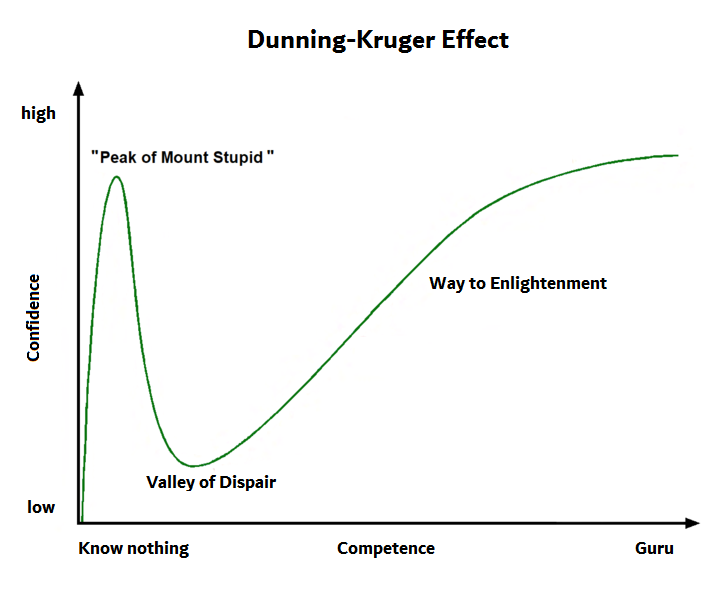Bias and Bytes: Why Self-Aware Humans Will Prevail Over Artificially Intelligent Algorithms
The Dunning-Kruger effect is a prevalent cognitive bias that has significant implications as we enter the 4th industrial revolution. This revolution is characterized by emerging technologies like artificial intelligence, robotics, and IoT that promise to reshape our world. But the rise of the machine also illuminates deeply human factors in the journey of enterprise.
Zoom image will be displayed

The Dunning-Kruger effect is the tendency for people with low ability in a domain to overestimate their competence and knowledge. Conversely, those with true expertise often underestimate themselves. This comes from a disconnect between one's actual performance and their perceptions of their own competence.
In enterprise, Dunning-Kruger can emerge when new technologies arise that require new skillsets. With complex areas like data science and artificial intelligence, business leaders often exhibit unwarranted confidence without solid expertise. They assume these advanced technologies are easy to master and apply, underestimating the nuanced human oversight still required.
As we journey deeper into the 4th industrial revolution, the gap between human knowledge and technological capability is expanding rapidly. This underscores the need for leaders to exhibit thoughtful confidence – enough to lead decisively but not so much as to downplay the expanding limits of their own comprehension. Self-awareness and humility become critical.
The essence of the human journey in enterprise is realizing that human creativity and intuition remain indispensable, even as technology progresses. Mastery still demands lifelong learning and understanding the nuances where human oversight provides an essential check on data-driven insights.
Machine learning can unlock groundbreaking capabilities to analyze data and make predictions. But blind faith in models leads to trouble. Human domain expertise contextualizes data and questions assumptions baked into algorithms. Ethics and philosophy guide the pursuit of organizational goals. And human creativity blends left-brain analytics with right-brain empathy and imagination.
The rapid pace of technology change can easily undermine competence. Proven business models are disrupted overnight. New competitors arise instantly, unencumbered by legacy. Continuous learning and adaptation become imperative to stay relevant.
Leaders must exemplify love of learning and model personal growth. Structures that support development, like tuition reimbursement and online learning platforms within an enterprise, provide enhancement. And mechanisms to systematically gather employee feedback make blind spots clearer.
The future will demand digital fluency while prizing distinctly human skills like imagination, ethics, empathy, and collaboration. Organizations must nurture uniquely human talents that AI cannot replicate. As machines rise, we rediscover our humanity.
In the 4th industrial revolution, the human journey in enterprise remains one of lifelong learning. Competent leaders stay humble, aware of the limits of their expertise. They combine confidence and decisiveness with curiosity, knowledge-seeking, and continuous growth.
And they focus on the human dimensions that shall always be essential – creativity, vision, intuition, ethics, empathy, and more. For though technological capability may surpass human comprehension, our distinctly human talents will enable us to channel AI’s potential to uplift society. The rise of the machine illuminates that which makes us most human.
Ultimately, the Dunning-Kruger effect is a reminder that in this era of exponential change, we must embrace lifelong learning, foster collective growth, and focus on the timeless human values that anchor our shared journey. Our confidence comes not from presuming expertise, but from the vulnerability and wisdom that emerges from continuously expanding our knowledge and synthesizing broad perspectives. By recognizing the limits of our individual cognition, we open ourselves to the collective human capabilities that shape our future.